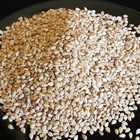

Nutrition
Sesame seeds are high in these minerals:
- copper
- manganese
- tryptophan
- calcium
- magnesium
Sesame seeds also provide iron, phosporus, and zinc, vitamin B1(thiamin) and vitamin E. The minerals found in sesame seeds play a crucial role in health. The rich, nutty flavor of sesame seeds can be found in food around the world. Toasted, the whole seeds can be sprinkled on a variety of dishes for extra crunch and flavor. They are also used raw in some dishes. Ground sesame paste is used in both sweet and savory dishes, and is a primary ingredient in both hummus and halvah, two popular Middle Eastern dishes. The oil from white and brown sesame seeds is used as a cooking and flavoring oil, and black sesame seed oil may be used in small amounts for flavoring as well.
Packaging: Stuffed in (20) feet container loads in Woven Polypropylene Sacks.

















